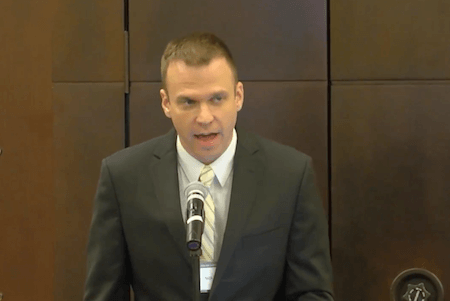The Iowa Supreme Court ruled on May 3 that a state law providing that the husband of a married woman who gives birth to a child is the presumptive father is unconstitutional to the extent that it doesn’t provide the same presumption of parentage for married lesbian couples.
The high court rejected a lower court interpretation the existing statute allows for that presumption of parentage, but affirmed the lower court’s ruling based on its conclusion the law is unconstitutional.
High court rules presumption mother's husband a parent invalid if not extended to same-sex spouses
The ruling, however, also points up the lingering impact of a 2010 statewide election in which three members of the Iowa Supreme Court, facing what are typically routine retention votes required to stay on the bench, lost their seats in the wake of the court’s unanimous decision a year before granting marriage rights to same-sex couples.
Melissa and Heather Gartner, a couple since 2003, had a commitment ceremony three years later and decided to have children together. After Heather gave birth to a child conceived through donor insemination, they went through a second-parent adoption ceremony and obtained a substitute birth certificate showing both women as parents of the child.
Heather was pregnant with a second child using the same anonymous donor when the Supreme Court issued its marriage ruling. After the child was born, the couple applied for a birth certificate showing both women as parents, on the assumption that a child born to a married woman would also be deemed the child of the mother’s same-sex spouse. But the State Health Department listed only Heather and insisted that if Melissa wanted to be listed she would have to go through an adoption proceeding.
Polk County District Judge Eliza J. Ovrom ruled in favor of the Gartners by construing two existing state laws to require it. First, she cited the requirement that a husband presumptively be listed on the birth certificate “unless paternity has been determined otherwise by a court of competent jurisdiction.” She then looked to another statute that provides that state laws should be interpreted as applying to both men and women when only one gender is used in the statute. Based on that, she concluded that because of the Supreme Court’s marriage ruling, the law regarding presumptive parentage should be construed in a gender-neutral manner. The birth mother’s spouse, she found, should be listed regardless of sex.
The state appealed.
Writing for the Supreme Court, Justice David Wiggins found that the trial court’s interpretation was incorrect. Iowa law does provide for gender-neutral interpretation, but not when a statute refers to both genders. The parental presumption statute refers to both the mother and the father, each having a distinct role, Wiggins asserted.
The Supreme Court then turned to an issue the trial court had avoided — whether that statute is constitutional. And the court, applying straightforward equal protection analysis, found it is not. The 2009 marriage decision found that cases of sexual orientation discrimination are subject to heightened scrutiny under Iowa’s Constitution. The state, therefore, must “show the statutory classification is substantially related to an important governmental objective” since it treats like classes differently. Under the law, when a married woman bears a child through anonymous donor insemination, her husband is nevertheless listed as the father on the birth certificate. The same is not true for the wife of a mother. Married lesbians and married heterosexual women who become pregnant through donor insemination are similarly situated, as are their spouses, yet they are treated differently.
The court made mincemeat out of three purported state interests Iowa put forward — “accuracy of birth certificates, efficiency and effectiveness of government administration, and the determination of paternity.”
Given that a husband is listed as a parent even if his wife uses an anonymous donor, Wiggins wrote, a birth certificate “does not always accurately identify the biological father.” In fact, a woman has no obligation to reveal the artificial insemination to the state. Requiring a lesbian mother’s spouse to adopt rather than simply be listed on the birth certificate, consequently, does not provide for any more accuracy.
Turning to the issue of administrative effectiveness, the court found that requiring an adoption procedure is less efficient, not more efficient, than simply listing the legal spouse on the certificate automatically.
And, on the question of a court rebutting the presumed paternity on a birth certificate, Wiggins wrote that it is rare for a sperm donor to come forward to mount a challenge. Anonymous donors, who are not informed about the use of their sperm, of course never step up.
Identifying a child’s two legal parents from birth is also important to the state, the court found.
“When a lesbian couple is married, it is just as important to establish who is financially responsible for the child and the legal rights of the nonbirthing spouse,” Wiggins wrote. “It is important for our laws to recognize that married lesbian couples who have children enjoy the same benefits and burdens as married opposite-sex couples who have children. By naming the nonbirthing spouse on the birth certificate of a married lesbian couple’s child, the child is ensured support from that parent and the parent establishes fundamental legal rights at the moment of birth.”
The inescapable conclusion for the court was that discrimination alone accounts for the disparate treatment of same-sex couples having a child.
“The only explanation for not listing the nonbirthing lesbian spouse on the birth certificate is stereotype or prejudice,” Wiggins wrote, using a phrase that appeared numerous times in his opinion.
The trial court had ordered the Health Department to issue the birth certificate the Gartners requested, but had stayed its order regarding any other lesbian couples. In affirming the trial court on constitutional grounds, the court lifted that stay.
There was no dissent, but significantly the three justices appointed in place of those denied retention did not join the court’s opinion. One did not participate in the case. The other two, in a brief “special concurrence,” observing that the state “accepts the [2009 marriage equality decision] for purposes of this appeal,” agreed that in that case, the statute on presumptive parentage “cannot be constitutionally applied to deny Melissa Gartner’s request to be listed as parent.”
These two justices clearly seem leery about any appearance that they accept the validity of the marriage decision. That despite the fact that a fourth justice from the 2009 court, up for a retention vote last fall, prevailed.
Lambda Legal represents the Gartners, joined by Des Moines counsel Sharon K. Malheiro of Davis, Brown, Koehn, Shors & Roberts P.C. While a number of LGBT, civil liberties, and professional groups wrote amicus briefs in support of the couple, the anti-gay Iowa Family Policy Center weighed in on behalf of the Department of Public Health.


































